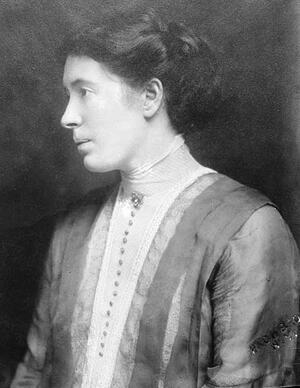Rose Pastor Stokes: Jewess with Attitude
On April 5, 1905, J. Graham Phelps Stokes —Yale graduate, businessman, scion of one of New York’s “Four Hundred” families, social worker at the University Settlement on the Lower East Side, dabbler in progressive politics — announced his engagement to Rose Pastor — Russian Jewish immigrant, cigarmaker-turned-journalist, self-identified girl of the Jewish ghetto.
Dwelling briefly on the couple’s religious differences, the New York press was quick to sensationalize this rags-to-riches story. In an eight-column article headlined “New York’s Most Interesting Romance,” the husband-to-be told a Hearst reporter, “My love for this woman whom I will make my wife is so holy and pure that the marriage ceremony is needed only to legalize a union that has existed between ourselves since the beginning.”
Months earlier, Pastor announced the engagement to her two closest friends, Miriam Shomer and Hattie Mayer, teachers at the Educational Alliance, a Lower East Side settlement house. She chose her words carefully: “Listen to me. I am making history. I am going to be married to the millionaire Stokes. Riches and poverty, Jew and Christian will be united. Here is an indication of the new era.” As a writer, Hattie Mayer eventually reclaimed her Russian Jewish name, Anzia Yezierska, when she took the Stokes-Pastor marriage as a ready-made plot for one of her best-known novels Salome of the Tenements.
Who was this woman who declared so dramatically that she was “making history”? Born in 1879, Rose was three when she and her mother, Hindl, abandoned by her father, left Poland for the poverty-ridden tenements of London’s East End. In 1889, Hindl immigrated to Cleveland with her new husband Israel Pastor, their infant son, and 12-year-old Rose. The Pastors sent her out to work almost immediately as an unskilled “stogey roller” in a cigar sweatshop. Israel, had failed in business twice before the family left London, and he had no more success as a junk peddler in Cleveland. He abandoned the family in the early 1900s; Rose became the primary breadwinner for her mother and five half-siblings.
Reading the Yidishes Tageblatt English page in 1901, Rose noted a plea for readers’ contributions. She responded. The editor, A.H. Fromenson, found her letter so clever he not only published it but hired her to write a regular column. “Just Between Ourselves, Girls,” signed by “Zelda,” began appearing soon afterward. The offer of a full-time job as a reporter and Fromenson’s assistant soon followed, and Rose Pastor arrived in New York in early 1903. When Fromenson ordered a reluctant Rose to interview and write about Stokes, who lived and worked at the University Settlement just down the street from the Tagblatt’s offices, the couple met and fell in love.
The Pastor-Stokes relationship is an important historical event. Its multiple boundary crossings—personal, political and racial— address a range of fascinating historical changes taking place in both Jewish and American history. The couple understood there was a politics to their union. Addressing the issue of changing gender roles, they characterized the marriage as a new kind of partnership. Acquaintances made no mention of Rose’s wifely abilities; instead they stressed her independence. After the engagement, she returned briefly to cigarmaking in order to “stay in touch with the people.” The Cigar Makers Union, which had denied her membership in Cleveland, admitted her now. The couple invited the press to a union meeting, where Rose gave a riveting speech about poor working conditions in Cleveland and New York. In 1906, they joined the Socialist Party.
In the end, the marriage was a relationship of mutual misrecognition. Rose and her fiancé both understood the conflict between poor and rich, but their standpoints diverged radically. Idealism fueled attraction, but also led to glossing over differences. Nevertheless, the vibrant political partnership lasted for well over a decade. The couple became members of a national network of political thinkers, journalists, activists, and organizers. Rose traversed the country, lecturing tirelessly for the Intercollegiate Socialist Society. Only with World War I did the marriage falter. Graham’s politics shifted rightwards, while Rose’s radicalism intensified. Welcoming the Bolshevik Revolution, she helped found the American Communist Party in 1919. They divorced in 1925, and each remarried within a year. Graham chose Lettice Lee Sands, a charming member of his elite social world. Ever the activist, Rose married Jerome Isaac Romain, a fellow immigrant from Poland and a communist party theorist.
With a few exceptions, U.S. historians and students of American Jewish life have paid scant attention to Rose Pastor Stokes. One wonders why she has not yet been claimed as the “Jewess with Attitude” that she clearly was.
Regina Morantz-Sanchez is Professor of History at the University of Michigan and a member of the Academic Advisory Council of the Jewish Women's Archive.
Photograph: Library of Congress







I just found out recently I'm a relative of Rose, long story short I think her grandfather is my great-great-great-grandfather, anyway I've since been looking up info on her. as well as all this, she was a Broadway produced playwright ... anyway thanks for posting!
In reply to <p>I just found out recently by Jerry
Hi--I'm her great-great niece. Is there a way I can get in touch with you? Doing a project on her and trying to find other relatives.--Kate
In reply to <p>Hi--I'm her great-great by kate
JWA has forwarded your message. We hope that Jerry will respond to you directly.
I wrote my senior thesis on Rose Pastor Stokes. I've always been intrigued by her story and baffled by the lack of attention she has received. I'm so glad that she is being recognized here as a Jewess with Attitude!